The Ways We've Been Taught to Love Aren't Okay. They're Traumatizing.
Part 1: Unlearning Toxic Romance
Hello dear ones,
As per usual, I’m thinking so much about love and intimacy and trauma and healing, and felt called to write a series of posts with my reflections on how the ways we’ve been taught to love are traumatizing. I want new visions of love that aren’t toxic and insecure and co-dependent. I want love that prioritizes friendship as much as romance. I want love that refuses to play games and is messy and imperfect and challenging, but so so worth it.
Friendly reminder that your subscriptions mean so much to me, whether they’re free or paid. I’m currently working towards my goal of having 500 paid subscribers and 10K free subs by the end of 2024. Every time you share a quote that you love or the link to this essay, you’re helping me get one step closer to my dream of living off of my writing. Thank you for being here.
One of the most common conversations I have with my two besties is about how fucking hard it is to unlearn the toxic forms of love and romance that we were taught to romanticize. This is work that we’ve all actively been doing for years and years — both in our romantic relationships, as well as our platonic, and everything that falls in between.
As someone whose sun sign is Cancer aka the hopeless romantic, this unlearning began as a real dark night of the soul existential crisis situation. What do you mean I’m not gonna be rescued by a knight in shining armor on a horse??? But I just want that magical teen movie first kiss! But if he’s not sure if he’s truly into me, I just gotta stick around until he realizes just how deeply in love with me he is!
Slowly but surely, I’ve realize that the ways we’ve been taught to love just aren’t okay. Because the truth is that the love I was taught to aspire to actually traumatized me. That’s the TLDR for this essay. I’m gonna move through some of the fucked up things we’ve been told about love, challenging the normative scripts of what love and romance are along the way.
As a child of the 90s, I grew up watching Disney movies with princes rescuing princesses, and I loved — and still do love — romcoms. All I dreamt about was love. I couldn’t wait until I found that person who gave me butterflies and have the most magical first kiss ever. When I had a crush — which was all the time — I couldn’t eat, couldn’t sleep, couldn’t stop thinking about that person.
Because I was an awkward tween and not one of the cool popular girls, my love took the shape of pining after boys who would hang out with me in secret but date the cool girls publicly. I wrote poems about how one day they’d realize that I was the one for them all along. I wanted so badly to have the Rachel Leigh Cook moment in She’s All That where I walk down the stairs, post make-over, and my own Freddie Prinze Jr can’t believe that this babe has been in front of his eyes all along.
It would take me rewatching this movie in my late 30s to realize that the premise of this movie was kinda fucked up. Two boys make a bet that Lainey Boggs can’t be transformed into a prom queen, Lainey, being her magical self, kinda weird-pixie-art-girl’s her way into Zack’s heart, but it’s not until she has a makeover that he truly realizes what a babe she is.
Through my cultural education, and having A LOT of attachment wounding, I became a pro at romanticizing toxic dynamics. These definitions of love and loving were best captured when I asked folks on my Instagram to answer the question “What were you taught romance should feel like?”
Excitement and spark; butterflies; danger-thrill levels of excitement; fireworks and sunsets all the time;
Giving self over entirely; not having any needs of one's own; sacrificing everything;
Eternal; obsession; can’t sleep, can’t eat; that it’ll make you feel crazy; all encompassing; can’t live without the other person;
Possessiveness; extreme jealousy; monogamy; marriage; make you feel whole;
Effortless; magical; little need for direct communication;
Exhilarating need while at the same time being totally chill.
What I see in these responses in co-dependence (which, for me, is not the same as interdependence), I see enmeshment, and insecure attachment. I too once believed that this was romance. Then I had my first securely attached partnership. Jessica Fern, the author of Polysecure: Trauma, Attachment and Consensual Nonmonogamy (my fav book on attachment regardless of whether you’re polyamorous) offers this definition of secure attachment:
“People with a secure attachment style experience a healthy sense of self and see themselves and their partners in a positive light. Their interpersonal experiences are deeply informed by their knowledge that they can ask for what they need and people will typically listen and willingly respond … A child with a secure attachment style will likely grow up into an adult who feels worthy of love and seeks to create meaningful, healthy relationships with people who are physically and emotionally available. [They’re] comfortable with intimacy, closeness and their need or desire for others. They don’t fear losing their sense of self or being engulfed by the relationship … securely attached people experience relational object constancy, which is the ability to trust in and maintain an emotional bond with people even during physical and emotional separation.”
Drawing on the work of Mary Ainsworth and Silvia Bell, Joanna Chambers summarizes the differences between secure and insecure attachment as follows: “Secure attachment was defined as the ability to carry a representational model of attachment figures as being available, responsive, and helpful. Insecure attachment was defined as not seeking out the attachment figure when distressed or having difficulty moving away from the attachment figure, likely due to having an unresponsive, rejecting, inconsistent, or insensitive caretaker.”
Our experiences with our caregivers impact us at a neurobiological level and shape when and how our reward circuits release dopamine and oxytocin. Katherine Wu explains: “Dopamine, produced by the hypothalamus, is a particularly well-publicized player in the brain’s reward pathway – it’s released when we do things that feel good to us” and comes into play when we’re attracted to another person. Alongside the release of dopamine is norepinephrine, which “may sound familiar because it plays a large role in the fight or flight response, which kicks into high gear when we’re stressed and keeps us alert.”
These chemicals make us giddy, energetic, and euphoric, even leading to decreased appetite and insomnia – which means you actually can be so ‘in love’ that you can’t eat and can’t sleep.” Dopamine releases oxytocin aka “the love drug” and both of these chemicals can push us towards humans who will not give us the love that we actually so desire.
Attachment shapes attraction, romance, and love. “Kids who are securely attached to their adult caregivers will, as adults, most likely attach securely to their romantic partners, and kids who are insecurely attached to their adult caregivers will, as adults, mostly likely attach insecurely to their romantic partners,” writes Emily Nagoski in Come As You Are.
If we grew up experiencing insecure attachment, then our reward circuit is hardwired to release dopamine and oxytocin when we receive the hard-earned rewards of insecure relationships. If you’re anxiously attached, the reward is your partner turning towards you. If you’re avoidantly attached, the reward is distance from your partner. And if you have disorganized attachment, proximity and distance can each be their own rewards.
For us insecurely attached humans, secure attachment will not feel as good to us because of how our reward circuit is oriented. We may find ourselves thinking “This can’t be love because I’m not feeling all of these intense emotions” that usually release these reward chemicals that make me feel good while also paradoxically making me feel bad.
I know this feeling all too well. As an anxiously attached child, I was forever chasing my avoidantly attached father. I was searching for that missing experience: that somehow, I could help him open up and heal his attachment wounding. And once he’d healed, he could love me fully.
All of my romantic relationships followed suit: I was always falling for boys who couldn’t fully commit; who were scared of intimacy; and who withheld their depths of their emotional landscape from me. This chase, and the brief moments of intimacy I’d sometimes obtain, produced dopamine hits that were tethered to the insecure forms of attachment I grew up with.
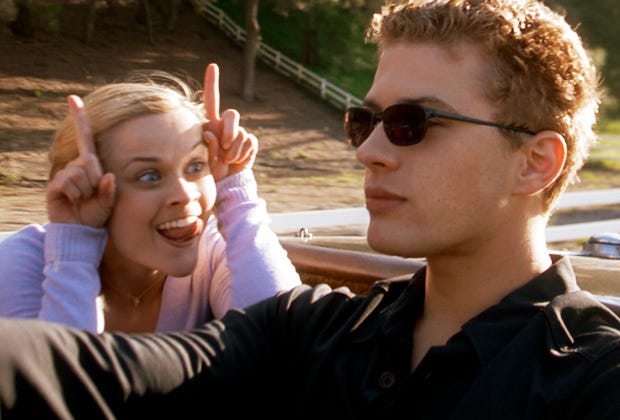
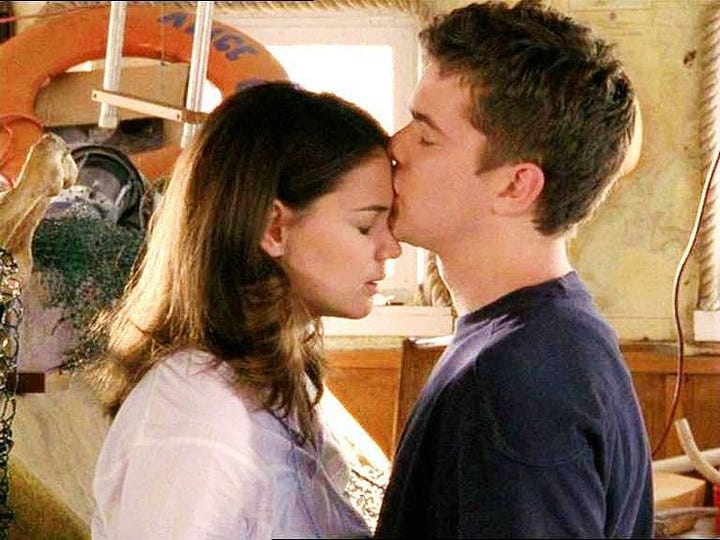
In a recent therapy session, my therapist shared with me that our understanding of intimacy and love can be shaped by a negative or positive valence. With a negative valence, we come to understand that safety – which is really one of the core principles of secure attachment – is dangerous, because that’s what we experienced growing up. With a positive valence, we learn that safe connection is pleasurable, not painful.
I see this positive valence in the responses I received to the second question I posed on Instagram: “What have you learnt love feels like to you”?
Simple comforts; feels like a roasted squash on a Wednesday; being comfortable; comforted and secure; safety; peace; freedom; trust; ease; soft, gentle, unassuming;
Being myself; joy and acceptance; honesty;
Slowly getting closer to someone to wants to hold me and be held by me; shared vulnerability; collaboration; sharing the task of creating joy and pleasure; excitement about collaboratively building a flexible, loving, evolving relationship together; supporting each other’s growth;
Clarity and communication; asking each other the right questions patience; quiet thoughtfulness; gratitude; calm.
These definitions of romance stand in stark contrast to the ones we’ve inherited. Instead of overwhelming intensity of feeling, we experience calm, ease, peacefulness. Instead of sacrificing yourself to the other in the name of love, we get to exist and grow as our own autonomous being. Instead of fastly falling in love, we move slowly and easefully into love that is collaborative. Romance, in this way, might feel a whole lot more boring; in fact, it might not feel like romance if we’re still holding onto these old definitions.
One of my besties recently described her experience unlearning these toxic definitions to me in a text: “No one is like ‘when you meet the right person your body will scream to get away, will experience waves of terror, and your mind will desperately cling to your last toxic relationship where your needs weren’t met and you feel small and helpless in the fact of the possibility that someone may actually try and be capable of meeting your needs and being safe and healthy.”
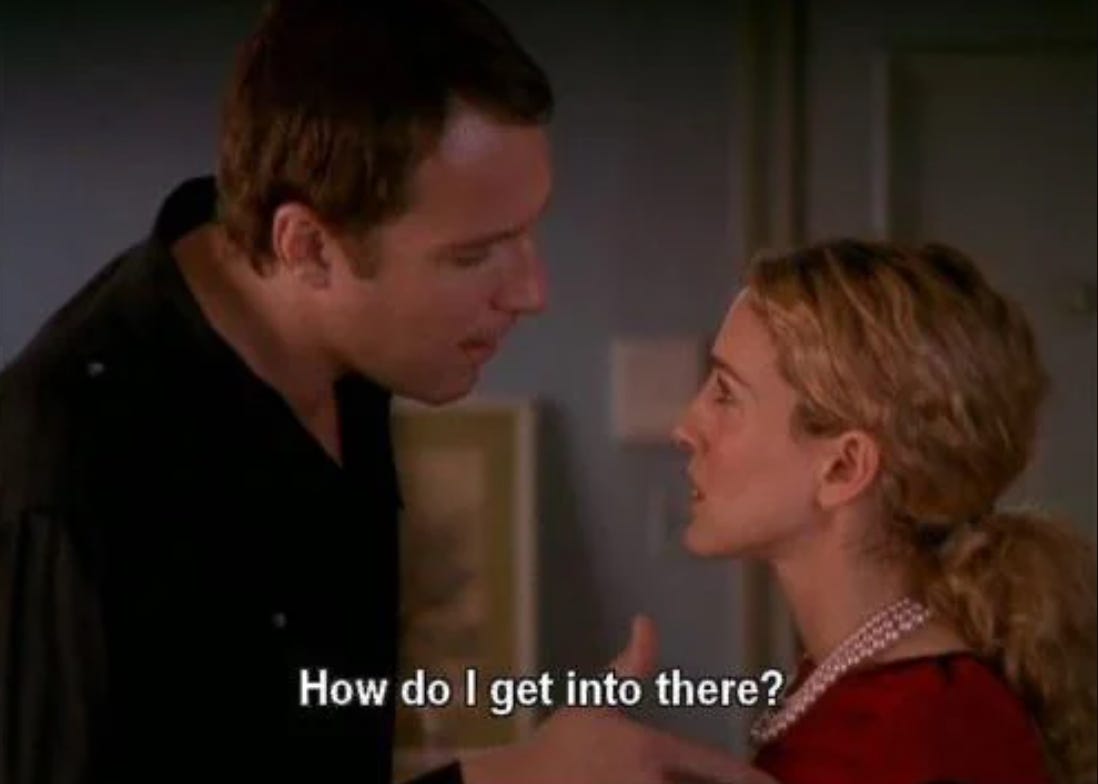
When we finally experience our first taste of secure attachment, our nervous system freaks the fuck out. It will scream at us “We’re not safe!” and our trauma brain will decide how to respond. Do we fight? Do we flee? Do we freeze? Do we submit? While all of those options will feel very appealing, we actually need to do the scariest thing possible and complete the stress cycle. We need to open ourselves up to the experience of safety. Which is a lot easier said than done when our survival physiology is oriented towards protection and away from connection.
Love isn’t easy. I really want to disrupt the story that when we meet “the one” it will feel effortless, you’ll never have conflict, it will just be easy. Building secure attachment is truly the hardest work I’ve ever done in my life. I’ve had to confront all of my attachment wounds, spend countless hours in individual and couples therapy, move through so much dysregulation, stretch my window of tolerance, and unpack all of the toxic romance narratives that have shaped my definition of love.
Now, I turn towards a different understanding of love, one that requires a lot more work. In her book All About Love, bell hooks writes: “The word ‘love’ is most often defined as a noun, yet all the more astute theorists of love acknowledge that we would all love better if we used it as a verb.” Quoting M. Scott Peck’s book The Road Less Traveled, hooks continues: “he defines love as ‘the will to extend one’s self for the purpose of nurturing one’s own or another’s spiritual growth.’ Explaining further, he continues: ‘Love is as love does. Love is an act of will—namely, both an intention and an action.’”
Inspired by hooks, I wrote this series of memes on my Instagram:
So many of us grew up believing that love was fulfilling another's expectations of us. bell hooks taught me that love is not the same thing as care; and this revelation broke my heart. Love is not a roof over your head or food on the table. Love is feeling like that roof is home; love is a table you want to sit at.
Love is not contingent upon accepting the mirror of another person's projections. Love is the space for detours and fumbling and mess. Love is the permission to just be as nothing more or nothing less than who you are in this moment. Love is the encouragement to expand into the fullest version of yourself.
Love is the permission to breathe. To open up your chest and expand into the space between your lungs. Love is the commitment to the practice of undoing, unburdening, unraveling. Love is more than a feeling. Love is a practice.
Much of the writing here comes from my essay “Queer Romance,” which can be found in my chapbook Chaotic Love: an other essays on intimacy.
Thanks for making it all the way to the end! If you’re feeling called to support me and this writing, here are a few ways you can do so!
Become a paid subscriber to this newsletter for $5/month — or on sale right now for $3.35!!
Sharing is caring: share this newsletter on your social media and tag me! No matter how many followers you have, or whether your account is private, these endorsements go a long way.
Send me a tip via Venmo, PayPal, or my website! Every $1 truly does add up and brings a smile to my face.




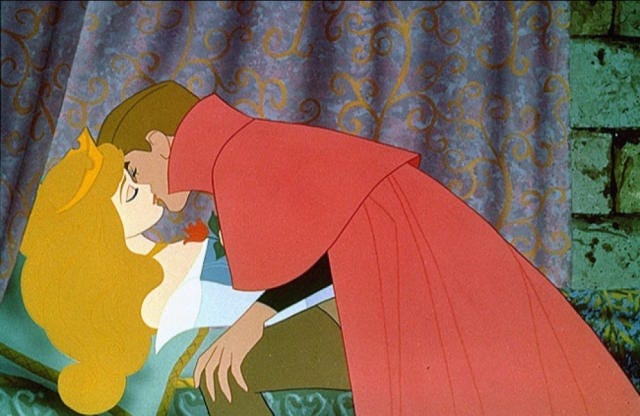
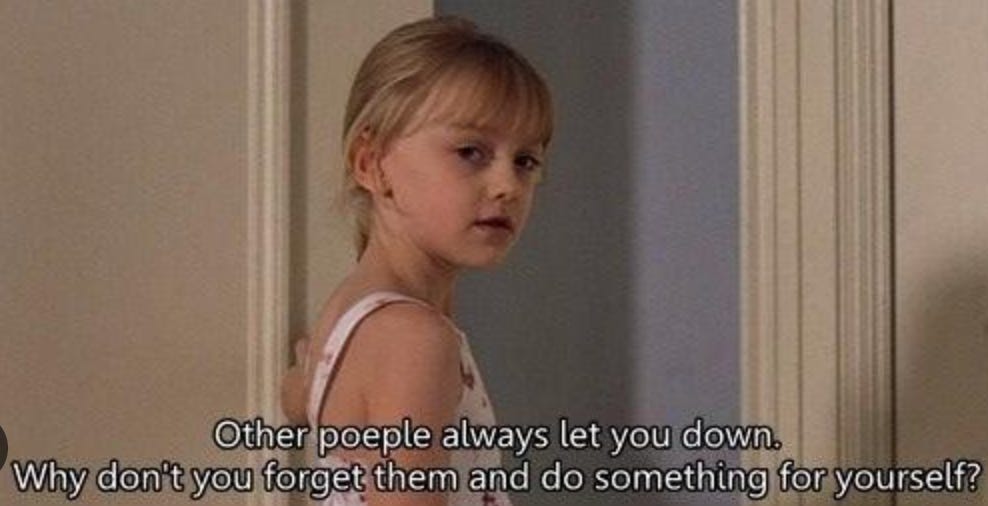
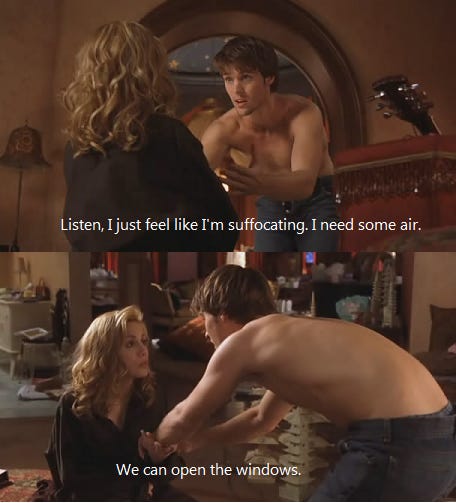
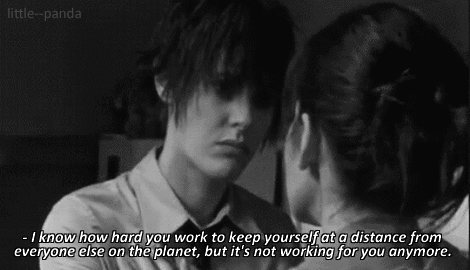
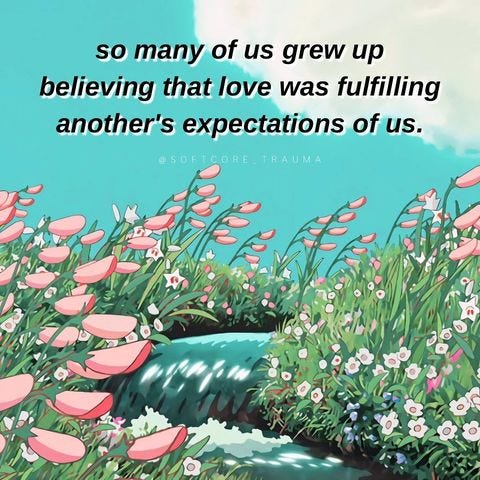
Wow. I mean this one made me cry. People really do always say "real love is easy" yet it's actually the hardest thing I've ever done/will ever do--especially when secure attachment is something you have to retrain your mind, body and soul to learn. Thank you so much for sharing Margeaux, your shared thoughts are healing!
👏👏 I need a class action lawsuit for Mr. Big alone
No but really, these movies convinced me at a deep level that took decades to root out that the “male lead” is always the avoidant, emotionally detached, externally successful guy. So that’s who I would cast. And spoiler alert: My patience, affection and wit were never ever rewarded with a satisfying character arc.